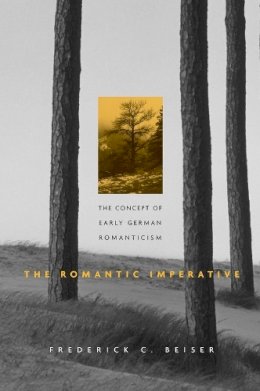
The Romantic Imperative
Frederick C. Beiser
The Early Romantics met resistance from artists and academics alike in part because they defied the conventional wisdom that philosophy and the arts must be kept separate. Indeed, as the literary component of Romanticism has been studied and celebrated in recent years, its philosophical aspect has receded from view. This book, by one of the most respected scholars of the Romantic era, offers an explanation of Romanticism that not only restores but enhances understanding of the movement's origins, development, aims, and accomplishments--and of its continuing relevance.
Poetry is in fact the general ideal of the Romantics, Frederick Beiser tells us, but only if poetry is understood not just narrowly as poems but more broadly as things made by humans. Seen in this way, poetry becomes a revolutionary ideal that demanded--and still demands--that we transform not only literature and criticism but all the arts and sciences, that we break down the barriers between art and life, so that the world itself becomes "romanticized." Romanticism, in the view Beiser opens to us, does not conform to the contemporary division of labor in our universities and colleges; it requires a multifaceted approach of just the sort outlined in this book.
Product Details
About Frederick C. Beiser
Reviews for The Romantic Imperative
Karl Ameriks, Professor of Philosophy, University of Notre Dame This book is a very fine and erudite study. It is impressively wide-ranging: literature, metaphysics, political philosophy, science, ethics, and religion all come seriously into play. It almost functions as an introduction to Early German Romanticism at a very high though not forbidding level.
Ian Balfour, Professor of English, York University The author writes clearly and lucidly, arguing forcefully and convincingly on the basis of sovereign knowledge of the material. [A] most excellent volume.
Joe K. Fugate
German Studies Review
The historically-minded philosopher Frederick Beiser has established himself as one of the clearest and most insightful interpreters of German thought in the age of idealist philosophy and romanticism. His latest contribution to the field reinforces that reputation and will certainly influence future debates about the nature and implications of German romanticism in its early years around 1800...Ultimately, Beiser's new book will be useful for those wanting a quick introduction to the early German romantics and to the scholarly literature about them. Above all, it should help to get literary critics, philosophers and historians talking to one another about an expanded range of issues fundamental to the study and legacy of early German romanticism.
Brian Vick
European History Quarterly
